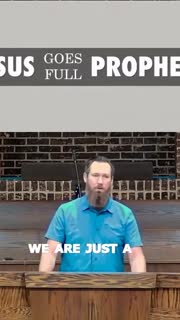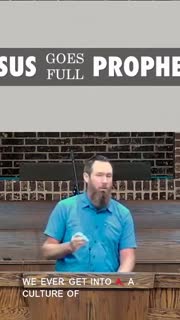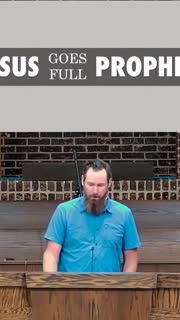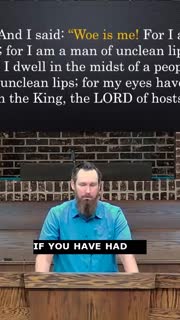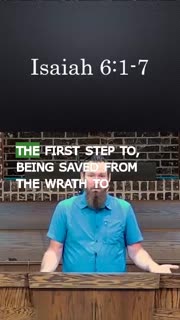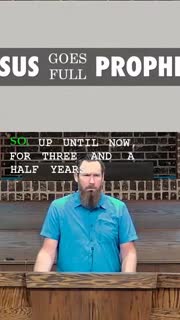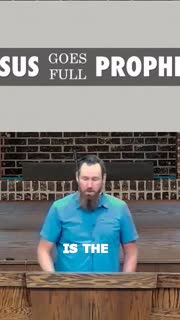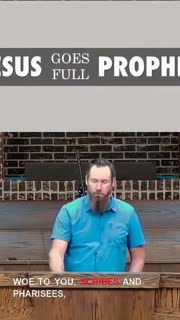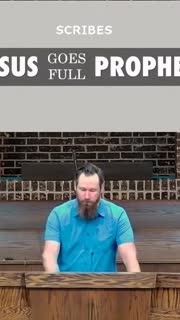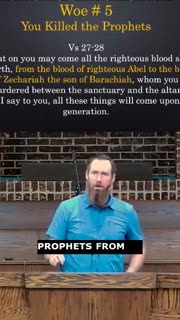Inner Purity and True Righteousness: A Call to Repentance
Devotional
Sermon Summary
Bible Study Guide
Sermon Clips
### Quotes for Outreach
1. "We are just a few days away from His mission accomplished. And of course, that's not the death, but the resurrection. Because if the resurrection had not happened, we would not have a mission accomplished. He would just be one of many false messiahs. The resurrection is where it's all at. That's the key. That's the crux." [30:30] (27 seconds)
2. "If we ever get into a culture of Christianity that is more focused on feeling good than what the truth of scripture actually says, then we're going to be at a point where judgment or revival are the only two possible solutions. And that's exactly where we are at, if you didn't notice. That's where we are. There's only two solutions to our problem. It's judgment, and judgment, begins in the house of God. Or revival." [33:33] (31 seconds)
3. "To prophesy, from my understanding, is to declare the word of the Lord. That's what prophesying is. To declare the word of Yahweh. Thus saith the Lord. And whatever follows those words is a prophecy. And while modern-day prophets rely on God's revealed word, right, modern-day prophets rely on this. The Old Testament prophets did so with direct revelation from the Lord." [37:04] (42 seconds)
4. "If you have had your sins washed away by the mercy of Christ, then stop looking at yourself as anything other than perfect because it's not your righteousness, but the righteousness of Jesus that's being manifested in your life. Rest in his mercy, knowing that it's not on you, it's on him, and he's claimed you as his own. You are his. So start living like that." [01:33:13] (29 seconds)
5. "The first step to being saved from the wrath to come, is asking that question. Am I one of these people? Because the prideful Pharisee says, no, I'm definitely not one of those people. Look what, look what a repentant heart looks like. Watch this. In the year that King Uzziah died, I saw the Lord sitting upon a throne high and lifted up, and the train of his robe filled the temple." [01:29:34] (29 seconds)
### Quotes for Members
1. "So, up until now, for three and a half years, Jesus has been pressuring the people of Israel to follow Him, to see Him for who He is. He's been doing signs and wonders and multiple proofs, so many proofs. It was so obvious that this is who it was. But we know exactly why the Pharisees and the scribes and the Sadducees didn't want Him to be it, because He wasn't playing their game." [31:53] (26 seconds)
2. "Preaching is the proclamation of what the Lord has said, right? Is it not? Now, there's teaching and there's preaching. Right now, I'm teaching. I'm teaching you what it means to be a prophet. I'm teaching you what it means to be a prophet. A preacher. A teacher. I'm showing you. I'm like teaching you right now. This is education. And we're going to switch at various times kind of back and forth between the two. I'm going to teach you and then I'm going to declare, thus says the Lord." [38:50] (29 seconds)
3. "Woe to you, scribes and Pharisees, hypocrites, for you tithe mint and dill and cumin and have neglected the weightier matter of the law, justice and mercy and faithfulness. These ought you to have done without neglecting the others. You blind guides, straining out a gnat and swallowing a camel." [46:56] (18 seconds)
4. "Woe to you, scribes and Pharisees, hypocrites, for you clean the outside of the cup and the plate, but the inside is full of greed and self-indulgence. You blind Pharisees. First clean the inside of the cup and the plate, and then the outside might be clean also. Woe to you, scribes and Pharisees, hypocrites, for you are like whitewashed tombs, which outwardly appear beautiful, but inwardly are full of dead people's bones and all uncleanness." [46:56] (25 seconds)
5. "The blood of all the prophets from the first to the last will be upon your heads. And then he says this very interesting. He says, you murdered them. Now this is actually very important. This is going to tie into chapter 24. And this is actually one of my proof texts for a point that I'm going to be hammering when we get to chapter 24." [01:23:12] (22 seconds)
Ask a question about this sermon
1. "We are just a few days away from His mission accomplished. And of course, that's not the death, but the resurrection. Because if the resurrection had not happened, we would not have a mission accomplished. He would just be one of many false messiahs. The resurrection is where it's all at. That's the key. That's the crux." [30:30] (27 seconds)
2. "If we ever get into a culture of Christianity that is more focused on feeling good than what the truth of scripture actually says, then we're going to be at a point where judgment or revival are the only two possible solutions. And that's exactly where we are at, if you didn't notice. That's where we are. There's only two solutions to our problem. It's judgment, and judgment, begins in the house of God. Or revival." [33:33] (31 seconds)
3. "To prophesy, from my understanding, is to declare the word of the Lord. That's what prophesying is. To declare the word of Yahweh. Thus saith the Lord. And whatever follows those words is a prophecy. And while modern-day prophets rely on God's revealed word, right, modern-day prophets rely on this. The Old Testament prophets did so with direct revelation from the Lord." [37:04] (42 seconds)
4. "If you have had your sins washed away by the mercy of Christ, then stop looking at yourself as anything other than perfect because it's not your righteousness, but the righteousness of Jesus that's being manifested in your life. Rest in his mercy, knowing that it's not on you, it's on him, and he's claimed you as his own. You are his. So start living like that." [01:33:13] (29 seconds)
5. "The first step to being saved from the wrath to come, is asking that question. Am I one of these people? Because the prideful Pharisee says, no, I'm definitely not one of those people. Look what, look what a repentant heart looks like. Watch this. In the year that King Uzziah died, I saw the Lord sitting upon a throne high and lifted up, and the train of his robe filled the temple." [01:29:34] (29 seconds)
### Quotes for Members
1. "So, up until now, for three and a half years, Jesus has been pressuring the people of Israel to follow Him, to see Him for who He is. He's been doing signs and wonders and multiple proofs, so many proofs. It was so obvious that this is who it was. But we know exactly why the Pharisees and the scribes and the Sadducees didn't want Him to be it, because He wasn't playing their game." [31:53] (26 seconds)
2. "Preaching is the proclamation of what the Lord has said, right? Is it not? Now, there's teaching and there's preaching. Right now, I'm teaching. I'm teaching you what it means to be a prophet. I'm teaching you what it means to be a prophet. A preacher. A teacher. I'm showing you. I'm like teaching you right now. This is education. And we're going to switch at various times kind of back and forth between the two. I'm going to teach you and then I'm going to declare, thus says the Lord." [38:50] (29 seconds)
3. "Woe to you, scribes and Pharisees, hypocrites, for you tithe mint and dill and cumin and have neglected the weightier matter of the law, justice and mercy and faithfulness. These ought you to have done without neglecting the others. You blind guides, straining out a gnat and swallowing a camel." [46:56] (18 seconds)
4. "Woe to you, scribes and Pharisees, hypocrites, for you clean the outside of the cup and the plate, but the inside is full of greed and self-indulgence. You blind Pharisees. First clean the inside of the cup and the plate, and then the outside might be clean also. Woe to you, scribes and Pharisees, hypocrites, for you are like whitewashed tombs, which outwardly appear beautiful, but inwardly are full of dead people's bones and all uncleanness." [46:56] (25 seconds)
5. "The blood of all the prophets from the first to the last will be upon your heads. And then he says this very interesting. He says, you murdered them. Now this is actually very important. This is going to tie into chapter 24. And this is actually one of my proof texts for a point that I'm going to be hammering when we get to chapter 24." [01:23:12] (22 seconds)
